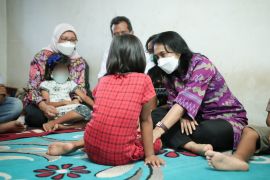"Even though, in general, the main causes of stunting are a lack of intake of nutritious food and disease, if examined further, sociocultural, economic, and political factors can widen the possibility (risk of stunting),” PPPA Minister Bintang Puspayoga said here on Thursday.
During a virtual webinar on “Prevent Stunting, Prevent Infection in Children,” she noted that in terms of the social and cultural aspects of society, stunting is related to gender inequality.
Although it is known that stunting is mostly caused by a lack of nutrition, it can also be triggered by environmental factors, repeated infections, and child marriage, she said.
Child marriage forces many girls to drop out of school. After marriage, girls have lower access to education, which causes a lack of knowledge regarding health or parenting, she said.
Child marriage contributes to poverty in women and children. It results in difficulty in access to health services and challenges in fulfilling children's nutritional needs.
Moreover, children and women can also face the issue of violence in the household, she added.
"Some of these issues are just a few examples. It is important for us to realize that resolving stunting issues cannot be done if we work alone or focus only on the health sector," Puspayoga said.
According to her, quality parenting must become the main key for preventing stunting and parenting responsibilities must be shared equally by the parents.
Parents must have a sense of responsibility and they must be resourceful and knowledgeable, especially in educating children, she said.
"All development sectors must work together, including by resolving issues of gender inequality and other women and children's issues that are related to one another," she added.
According to Puspayoga, increasing quality and competitive human resources has become one of the seven main national development agendas.
This is because currently, she said, children make up one-third of Indonesia’s total population and are expected to determine the nation's welfare in the future.
Stunting has become a priority issue for the government. The acceleration of stunting reduction has been declared as a national priority program through the 2018–2024 National Strategy for the Acceleration of Stunting Prevention.
Moreover, stunting prevalence has fallen from 24.4 percent in 2021 to 21.6 percent in 2022.
"This figure is still quite far from the 2020–2024 National Medium-Term Plan (RPJMN) target of 14 percent," she noted.
Related news: Stunting prevalent among children aged 6-24 months: Minister
Related news: Jakarta's stunting reduction efforts to focus on pregnant women
Translator: Hreeloita Dharma S, Resinta S
Editor: Anton Santoso
Copyright © ANTARA 2023












